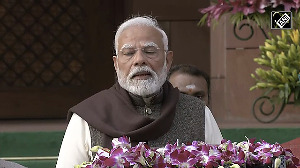
The international terror financing watchdog Financial Action Task Force (FATF) on Friday condemned the Pulwama terror attack that killed 41 Central Reserve Police Force jawans and decided to continue the 'Gray' listing of Pakistan for its failure to stop funding of terrorist groups such as Jaish-e-Mohammad, Lashkar-e-Tayiba and Jamat-ud-Dawah.
In a statement, the Paris-headquartered FATF said Pakistan should continue to work on implementing its action plan to address its strategic deficiencies, including by adequately demonstrating its proper understanding of the terror financing risks posed by the terrorist groups and conducting supervision on a risk-sensitive basis.
"The FATF notes with grave concern and condemns the violent terrorist attack last week that killed at least 40 Indian security forces in Pulwama in the State of Jammu and Kashmir," it said after the week-long FATF plenary held in Paris.
"Pakistan has revised its TF (terror financing) risk assessment. However, it does not demonstrate a proper understanding of the TF risks posed by Da'esh (ISIS), AL-Qaida, JuD (Jamat-ud-Dawah), FIF (Falah-e-Insaniat Foundation), LeT (Lashkar-e-Taiba), JeM (Jaish-e-Mohammad), HQN (Haqqani Network) and persons affiliated with the Taliban," the statement said.
Given the limited progress on action plan items due in January 2019, the FATF urged Pakistan to swiftly complete its action plan, particularly those with timelines of May 2019.
An Indian official, who attended the FATF plenary, explained that placement in compliance document means putting the country in 'Gray' list and it will be reviewed again in June 2019.
In June 2018, Pakistan was placed in the 'Gray' list and given a 27-point action plan by the FATF. This Plan was reviewed as the last Plenary in October 2018 and for the second time in this week-long meeting.
The decision has been taken after several rounds of deliberations during the plenary where India submitted new information about Pakistan-based terrorist groups, including Jaish-e-Mohammad, responsible for the Pulwama attack.
The FATF continuing Pakistan with the 'Gray' listing means downgrading of the country by multilateral lenders like IMF, World Bank, ADB, EU and also a reduction in risk rating by Moody's, S&P and Fitch, a security official said.
Pakistan was nominated for a detailed review of its 'serious deficiencies' in countering terror financing in February 2018. This nomination was supported by the United States, the United Kingdom, France, Germany and India, the official said.
At the end of this plenary, the FATF has observed that several deficiencies remain in Pakistan's legal regime in dealing with terror financing.
Since June 2018, Pakistan has made a high-level political commitment (statement by its Minister of Finance) to work with and address its strategic counter-terrorist financing-related deficiencies.
At the start of its deliberations, all members of the FATF observed a minute of silence for the 40 CRPF jawans who were killed in a suicide attack in Jammu and Kashmir. The President of FATF expressed sincere condolences to the people and the Government of India.
The FATF currently has 35 members and two regional organisations – European Commission and Gulf Cooperation Council.
41 Central Reserve Police Force personnel were killed and five injured on February 14 in one of the deadliest terror attacks in Jammu and Kashmir when a Jaish-e-Mohammad suicide bomber rammed a vehicle carrying a huge quantity of explosives into their bus in Pulwama district.
The FATF also said Pakistan should continue to work on implementing its action plan to address its strategic deficiencies, including by adequately demonstrating its proper understanding of the terror financing risks posed by the terrorist groups and conducting supervision on a risk-sensitive basis, demonstrating that remedial actions and sanctions are applied in cases of Anti-Money Laundering (AML) and Combating Financing of Terrorism (CFT) violations and that these actions have an effect on AML/CFT compliance by financial institutions.
Pakistan should demonstrate that competent authorities are cooperating and taking action to identify and take enforcement action against illegal money or value transfer services (MVTS), demonstrating that authorities are identifying cash couriers and enforcing controls on illicit movement of currency and understanding the risk of cash couriers being used for terror financing (TF), improving inter-agency coordination including between provincial and federal authorities on combating TF risks besides others.











 © 2025
© 2025